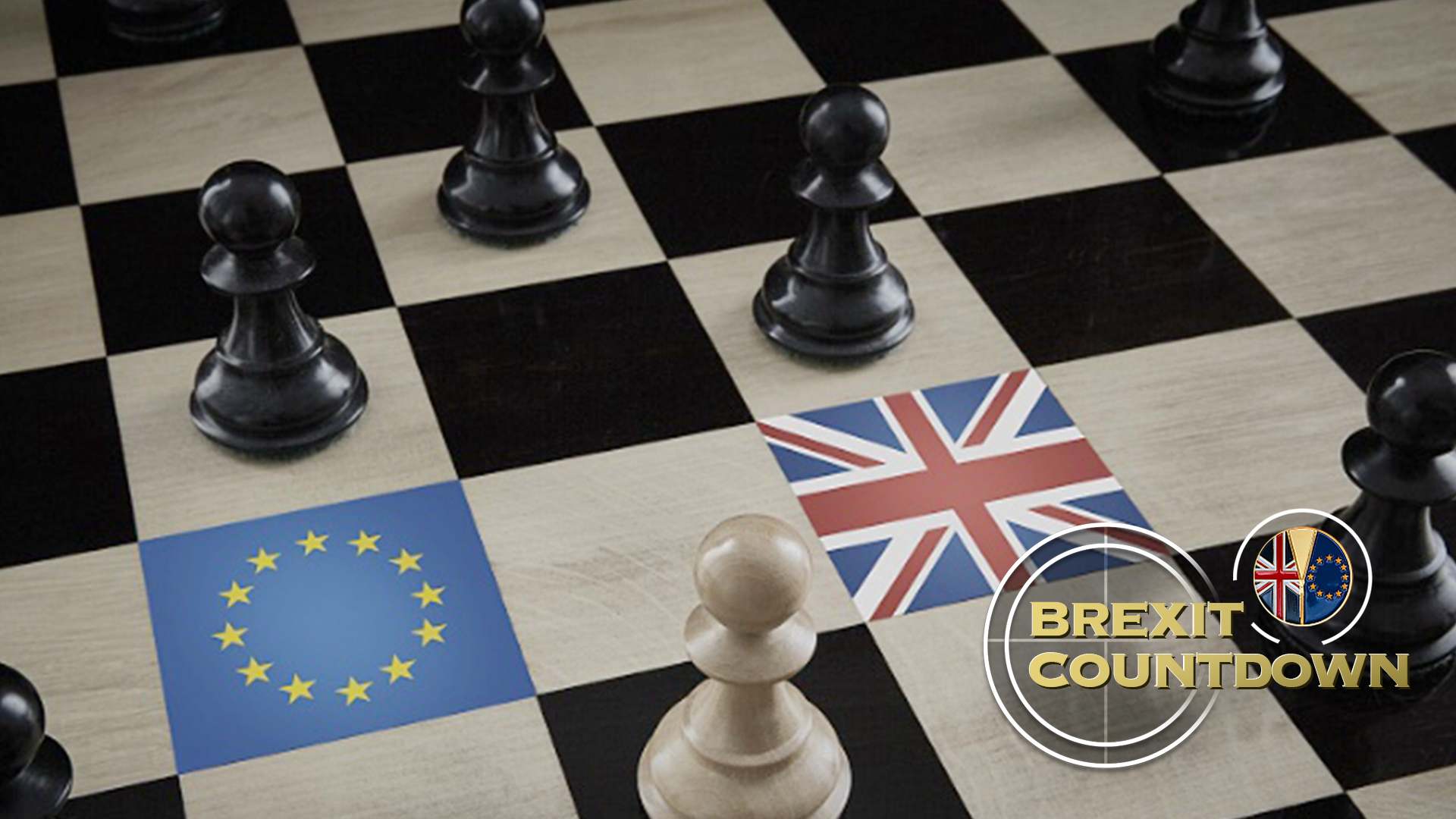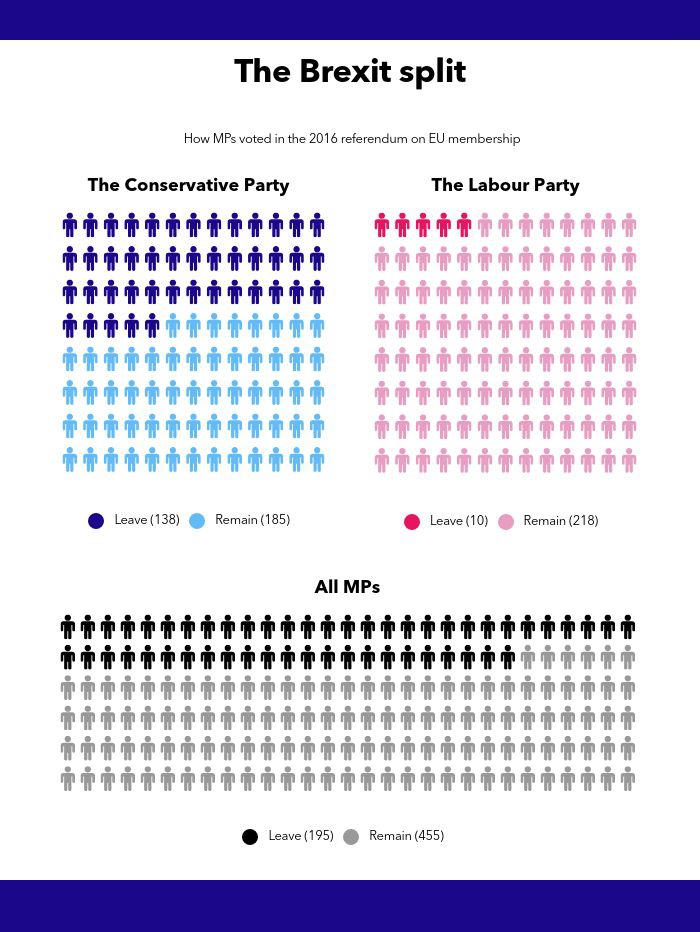
Europe
15:22, 27-Mar-2019
Parties divided: How Brexit has splintered UK politics
Alex Hunt

The nation is split almost down the middle over the European Union – with 51.9 percent voting to leave the bloc in the 2016 referendum and 48.1 percent voting to remain. Three years on, divisions linger, with big implications for the UK's two biggest political parties.
The Conservative Party
Led by Theresa May, the Conservatives have long felt theirs is the natural party of government in the UK – boasting past leaders including Winston Churchill and Margaret Thatcher.
But Europe has been a recurring problem – with the reigns of prime ministers Thatcher, John Major, David Cameron and now May all colored or shortened by party splits over the European Union (EU). In the 2016 referendum, 138 of its Members of Parliament backed leaving the EU, while 185 voted to remain.
Splits over Europe have never been starker, with one chunk of Conservative MPs – estimates suggest more than 50 – wanting to see a cleaner-break Brexit, in which the UK would negotiate a free-trade deal with the EU as if it were any other country.
Many of them would rather the UK cuts all ties with the EU in a no-deal Brexit than back the deal May put together because, they say, it still leaves the EU with too much control over the UK.
The question is, will they decide to back May's deal if it becomes clear the only other realistic option available is no Brexit at all?
But even if they reluctantly support what the Prime Minister has negotiated, all, or nearly all, of them want to see the end of May as leader, with a more Eurosceptic successor in place to steer the UK towards a free-trade deal post-Brexit relationship with the EU.
At the other end of the party are some of those who campaigned for remaining in the EU. Four have already quit for the new anti-Brexit Independent Group of MPs, saying that staying in the EU, or at least holding a fresh referendum, is better than May's deal.
Most of these MPs have stayed in the party and have been, in some cases reluctantly, voting for May's deal. They include several government ministers who would resign their posts rather than ever back a no-deal Brexit. Amber Rudd, the work and pensions secretary, is thought to be among them.
As with all things Brexit, there are many sub-groupings between these two wings of the party and, judging from the voting so far, the majority of the party's MPs are somewhere in the middle, willing to support the compromise Brexit deal May negotiated, but without any real enthusiasm.
Because of the way the House of Commons has lined up since the 2017 general election, there only needs to be about seven rebels for May to lose, even if she has the backing of the 10 MPs from Northern Ireland's Democratic Unionist Party.
It will have been quite an achievement if the Prime Minister does find a way to get her deal through the House of Commons, but it is likely to be too late to save her job, with a selection of possible successors already lined up by the different factions.
The current betting market in the UK puts the former Leave campaign leaders Boris Johnson and Michael Gove as early front runners followed by senior cabinet ministers with more middling Brexit views – such as Home Secretary Sajid Javid and Foreign Secretary Jeremy Hunt.

An infographic about the Brexit split. /CGTN Photo
An infographic about the Brexit split. /CGTN Photo
The Labour Party
It is not just the governing party that finds itself split over the issue of Brexit. The main opposition party also finds itself with differences to overcome, although not on the same scale as the Conservatives. Ten of its MPs were for Leave in the 2016 referendum, with 218 for Remain.
Party leader Jeremy Corbyn was for many years an MP with skeptical views of the EU, at the margins of the party. But after his surprise elevation to leader in 2015, he officially campaigned for remaining in the bloc.
However, his party's MPs – a big majority of whom opposed Brexit – thought he had failed to campaign enthusiastically enough and tried to topple him. They failed because the leader is elected by party members who overwhelmingly backed him again.
The official Labour policy is to respect the result of the referendum, so Brexit must happen. But the party says it must be done in a way that puts jobs first, with its key differences from Theresa May being the idea of joining a customs union for trade and more flexibility on allowing free movement of workers to continue.
The party also says it wants a general election, with the aim of getting into office and negotiating a Brexit that fulfills its criteria. If an election is not possible, then the party thinks a fresh referendum must be an option.
That policy, which was hammered out at the party's annual conference last year, was an attempt to paper over internal criticism of the party's position.
As Brexit and the possibility of a no-deal Brexit comes closer, the pro-Remain Labour MPs have become more outspoken in backing the idea of a fresh referendum that includes the option of Brexit being cancelled.
Eight anti-Brexit MPs – including one-time leadership hopeful Chuka Umunna – quit the party last month to co-found The Independent Group of MPs.
But there are also several Labour MPs – generally in areas where people voted to Leave the EU – who say Brexit must happen and oppose any suggestion of people being asked to vote again on the same issue.
The fact the party is in opposition means its differences on Brexit are not as sharply in focus as the Conservatives'.
But if there were to be a general election it is not clear whether Labour would go into it pledging a fresh referendum with an option to call off Brexit, or whether the pledge would be to deliver the long-term Corbyn plan of a "jobs-first Brexit" with the UK ending up in a customs union with "full access to the single market."
The smaller parties
It is worth recalling that most MPs wanted to stay in the EU – 70 percent of them backed Remain in the 2016 referendum, so it was always likely to be a challenge to get a Brexit deal through the House of Commons.
Generally, the smaller parties in the House of Commons have avoided big splits over Brexit. The third biggest party, Scotland's SNP, and the Liberal Democrats are both firmly anti-Brexit, while the DUP has been firmly pro-Brexit, only opposing May's deal because of the belief that it could weaken Northern Ireland's position in the UK.
(Top iamge: Strategic moves: The UK's major political parties have deep rifts over Brexit. /VCG Photo)

SITEMAP
Copyright © 2018 CGTN. Beijing ICP prepared NO.16065310-3
Copyright © 2018 CGTN. Beijing ICP prepared NO.16065310-3